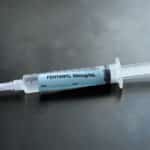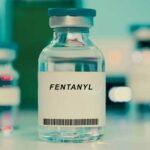Fentanyl (brand names Actiq, Sublimaze, and Duragesic) is a synthetic opioid analgesic that is classified as a schedule II drug by the United States Drug Enforcement Administration (DEA). Similar to morphine, fentanyl helps to treat those suffering from severe pain.
Fentanyl Drug Class
Fentanyl belongs to a class of drugs known as synthetic opioid analgesics. Because this drug produces feelings of sedation and euphoria, fentanyl is a narcotic that can become habit-forming and has the potential to be abused.
In fact, according to the United States Food and Drug Administration (FDA), prescription opioids may have benefits, but there are serious risks and side effects that may occur when used in a manner not prescribed to you by your doctor.
Fentanyl Drug Schedule
The United States Department of Justice (DOJ), along with the DEA, provides a list of controlled substances that have a high potential for abuse. This allows law enforcement to relay information to the public when new additions are added.
The Controlled Substances Act (CSA) manages drug control by dividing the substances into five different schedules.
Schedule II Substances
Fentanyl belongs to schedule II, a schedule in which the drugs listed have concerning abuse potential. All substances listed under schedule II may lead to severe physical or psychological dependence.
Schedule II drugs consist of both depressant and stimulant drugs. Besides fentanyl, some of the other CNS depressants include:
- methadone (Dolophine)
- hydrocodone (Vicodin)
- oxycodone (Oxycontin)
- hydromorphone (Dilaudid)meperidine (Demerol)
Examples of schedule II stimulants include methamphetamine (Desoxyn), amphetamine (Adderall, Dexedrine), and methylphenidate (Ritalin).
Fentanyl-related substances that are structurally related to fentanyl have been added to the schedule I drug list including acetyl fentanyl, butyryl fentanyl, and furanyl fentanyl.
Other Drug Schedules
As far as the other four drug schedules are concerned, schedule I substances do not have any medical use in the United States but have a high potential for abuse.
Examples of these substances include lysergic acid diethylamide (LSD), tetrahydrocannabinol, 3,4-methylenedioxymethamphetamine (ecstasy), marijuana (cannabis), and methaqualone.
Schedule III drugs have less abuse potential than schedule I or II and consist of narcotics and non-narcotics. Narcotics include Tylenol with codeine and non-narcotics consist of anabolic steroids.
Schedule IV drugs consist of lorazepam (Ativan), clonazepam (Klonopin), tramadol (Ultram), and diazepam (Valium) and have a low potential for abuse while schedule V mainly includes cough suppressants.
In addition to these drug schedules, there are also other substances that may be on the controlled substance list. For instance, medications which consist of derivatives, ethers, esters, and salts of isomers may be found on the controlled substances list.
Fentanyl Abuse
Abusing a drug for a long period of time can lead to a number of dangers. Not only will you experience heavy sedation during fentanyl use, you may also begin to develop constant cravings for the drug.
Dependence & Addiction
Schedule II drugs can be habit-forming and may lead to physical dependence. Because of this, one of the many dangers of taking fentanyl is becoming dependent and developing an addiction to the drug.
Fentanyl is a central nervous system (CNS) depressant which can cause profound sedation and even respiratory depression. Fentanyl is dangerous when taken in large doses or combined with other CNS depressants such as alcohol, benzodiazepines, or other opioids.
Overdose
According to the United States Department of Health and Human Services (HHS), high doses of fentanyl can cause a person to become unresponsive or stop breathing altogether. If you suspect a fentanyl overdose has occurred, contact 911 immediately.
If you or a loved one struggles with prescription drug abuse, please contact us today.
Sources
- Department of Health and Human Services — What are Opioids?
- Drug Enforcement Administration — Drugs of Abuse
- Drug Enforcement Administration — List of Controlled Substances
- Food and Drug Administration — Opioid Medications
- National Institute on Drug Abuse — What is Fentanyl?
- National Library of Medicine: MedlinePlus — Fentanyl
Written by
Northeast Addition Editorial Team
©2024 Northeast Addition Center | All Rights Reserved
This page does not provide medical advice.



